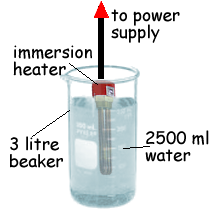Specific Heat Capacity and Latent Heat Questions - GCSE standard
 Q1. An electrical immersion heater supplies heat at a steady rate to 2.5 kg of water at 20°C in a container of thermal
capacity 1500 J/K and it is noticed that in 8.0 minutes the temperature of the water rose to 100°C.
Q1. An electrical immersion heater supplies heat at a steady rate to 2.5 kg of water at 20°C in a container of thermal
capacity 1500 J/K and it is noticed that in 8.0 minutes the temperature of the water rose to 100°C.
After another
hour, the water was just boiled away.
(a) Calculate the rate at which energy is supplied by the heater.
(Specific heat capacity of water = 4200 J/kg K)
(4 marks)
Heat given to the water while bringing it to the boil:
 Q = mass x specific heat capacity x
Q = mass x specific heat capacity x  T (from data sheet)
T (from data sheet)
= 2.5 x 4200 x (100-20)
= 840,000 J 
Heat given to the container as the water got hotter:
 Q = heat capacity x
Q = heat capacity x  T
T
= 1500 x 80
= 120,000 J 
Total heat energy supplied in 8.0 minutes:
Q = 840,000 + 120,000 = 960,000J 
Rate of heat supplied per second = heat supplied/time taken
power = P = 960,000/(8.0 x 60)
= 2000 J/s
= 2.0 kW 
(b) What value does this experiment give for the specific latent heat of vaporisation of water?
(2 marks)
1 hour = 60 x 30 = 3,600s
Heat supplied to the water to make it change state = Pt = 3,600 x 2,000 = 7,200,000 J
2.5 kg of water required 7,200,000 J to vaporise it , so
, so
1 kg would require 7,200,000/2.5 = 2,880,000 J to vaporise it.
The experiment gives a value of 2.9 x 106 J/kg as the value of the latent heat of vaporisation of water.
(c) The quoted value for the specific latent heat of vaporisation of water is 2.3 x 106 J/kg. Explain why the experimental result value differs from this.
(2 marks)
No account was taken of heat energy lost to the surroundings in the experiment.  That heat was taken as being used by the water changing state. Therefore the latent heat value was calculated to be higher than it really is.
That heat was taken as being used by the water changing state. Therefore the latent heat value was calculated to be higher than it really is.
(Total 8 marks)


